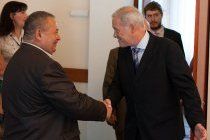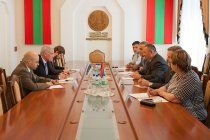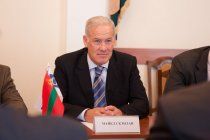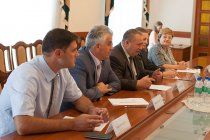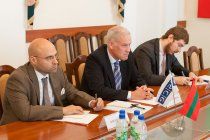 Русский
Русский English
English-







Continuation of the dialogue
Despite the fact that season of vacation in full swing, contacts at the international level do not stop. Today, the deputies of the Supreme Soviet Mikhail Burla, Sergey Cheban, Galina Antyufeeva and Viktor Guzun at the parliamentary site met with the head of the OSCE Mission to Moldova Michael Skenlanom.
This is the second visit of the OSCE representative for the last time. Discussion of the issues that were risen during the previous April meeting continued in the course of the dialogue: relations with neighboring countries, preparations for the elections to representative bodies November 29, 2015, the situation in the economy and the social sphere.
The deputies worry about the last theme increasingly. The deterioration of the socio-economic situation in the country becomes a subject of discussion in numerous meetings of legislators with voters, receptions on personal issues, which are actively carried out in the summer period.
Speaking about the situation in the economy, Chairman of the Supreme Council noted that it continues to be difficult. Due to the external restrictions the volumes of exports outside the country decreased, turnover decreased. Manufacturers who send their products to the Russian market, due to the devaluation of the national currency, are significant losses. Budget to implement state social obligations is insufficient because of these negative factors. Pensions and salaries to state employees not paid in full.
Commenting on the results of the meeting, the Speaker noted that the theme of the upcoming autumn elections to the Supreme and local councils is not left unattended. They will be combined in the country for the first time. According to the speaker, we do not have experience of a single day of voting. He expressed hope that they will be held at the proper level.
Another important issue for the residents of the Republic connected with the recognition by Moldova of civil status documents issued by the competent authorities of Pridnestrovie (birth certificates, marriage and divorcement, education). Today, this procedure is difficult for citizens, so a mechanism should be developed to help solve the social problem.


